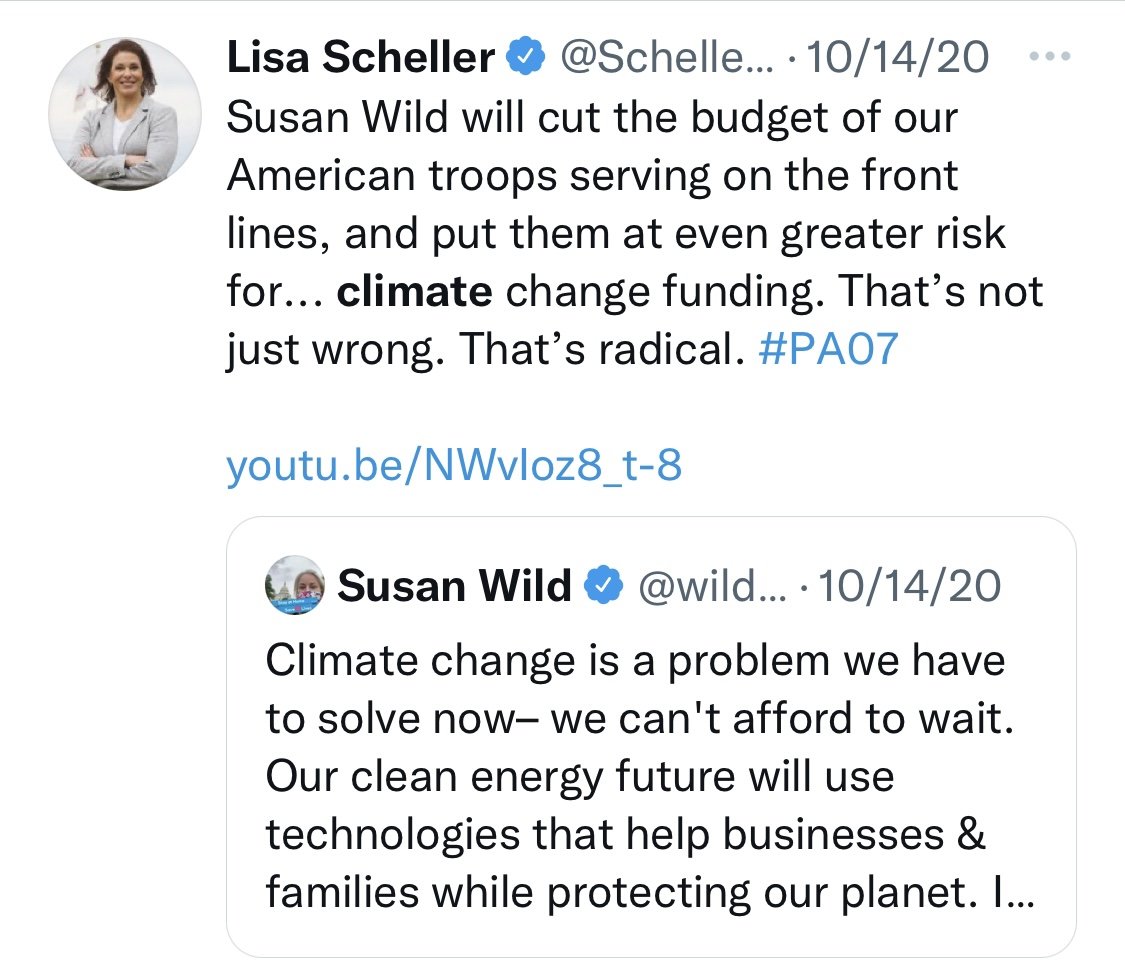Climate Candidate Briefing:
Susan Wild (PA-7)
Race Status & Polling
Susan Wild’s race is rated a toss-up. As a sitting member of Congress, she is an incumbent candidate, meaning she’s playing defense against a challenger.
This section will be updated with district-specific poll results as they are published.
Potential Presidential Candidate - PA statewide: Biden 45% / Trump 40% (February 2022)
Pennsylvania’s 7th Congressional District
Pennsylvania’s 7th congressional district is on the eastern border of the state, just north of the Philadelphia metro area and including the Lehigh Valley.
Susan Wild outperformed President Biden in her district in 2020, winning by 3.8 percentage points, while President Biden’s margin was only 0.6%. Pennsylvania has since redrawn its congressional map, which gave PA-7 an R+4 partisan voter index when it was previously rated as “even.” This puts Susan Wild at a disadvantage relative to her last election.
Climate impacts:
Pennsylvania’s average temperature has risen 2 degrees F since the beginning of the 20th century.
Pennsylvania has become significantly wetter, and winter and spring precipitation is expected to increase by 10-15%.
Sea level rise will increase coastal flooding along Pennsylvania’s rivers.
Climate attitudes:
According to the Yale Program on Climate Change Communication, 65% of voters in PA-7 are concerned about climate change, while 71% believe it will harm future generations. Both are equivalent with the national average.
Sixty-one percent believe Congress should do more about climate change, on par with with the national average. However, only 52% believe climate change should be a “high priority” for the next president and Congress, below the national average.
Climate issues tend not to be discussed much among the electorate. Only 32% indicated they talk about climate change even “occasionally,” which was slightly below the national average.
Susan’s Climate Position & Record
According to the League of Conservation Voters scorecard, Rep. Wild takes favorable votes on climate 96% of the time, averaged across her terms in Congress. She is a co-chair of the New Democrat Coalition’s Climate Change Task Force along with Rep. Sean Casten (D-IL). She has cosponsored numerous climate bills and, as a self-described “ardent environmentalist,” has been outspoken in committee hearings and in public statements about the need for rapid decarbonization.
Susan Wild’s campaign website outlines a climate platform centered on reducing emissions and meeting U.S. targets under the Paris Agreement, standing up to Big Oil and preventing new fossil fuel development on protected lands, investing in green jobs, and addressing pollutants like PFAS chemicals.
“Climate change is the existential threat of our time and it must be treated with the urgency it demands. I, along with my colleagues, passed the Climate Action Now Act, which was the first congressional vote in over ten years to address the threats to our climate. This landmark legislation would bring America back in line with the Paris Accord, which aims to reduce worldwide carbon emissions, and it would require the President to detail to Congress his plans to meet emissions reductions.
Climate change and the influence of Big Oil are decimating our remaining natural wonders and seashores. I was proud to vote to protect our national resources and lands from offshore drilling, and I will vote against further attempts to ruin our national parks, the Arctic National Wildlife Refuge, and offshore areas.”
The Opposition
Susan’s opponent is Lisa Scheller, a businesswoman. She has not demonstrated any commitment to high-impact climate policy. In fact, Scheller has mocked Susan Wild and the Democratic Party for supporting climate investment. Here’s a sample from her Twitter:
Concurrent Elections
Susan Wild will be on the ballot alongside two critical statewide races in Pennsylvania. The positions of governor and U.S. Senate are both wide open, toss-up races, which means we have a real chance of electing climate candidates up and down the PA ballot. Both Democratic Governor Tom Wolf and Republican Senator Pat Toomey are vacating their seats, as Gov. Wolf is term-limited and Sen. Toomey has announced his retirement. This section will be updated after general election candidates have been determined in those races.
Key Dates and Resources
October 24: Voter registration deadline
November 1: Mail-in ballot application deadline
November 8: General election (mailed ballots must be received by this date)
Resources
2022 House race ratings (Cook Political Report)
2022 House Crystal Ball (Larry Sabato, UVA Center for Politics)
2022 House elections (FiveThirtyEight)
Member of Congress scorecard (League of Conservation Voters)
Follow @wildforcongress on Twitter to stay up to date!



